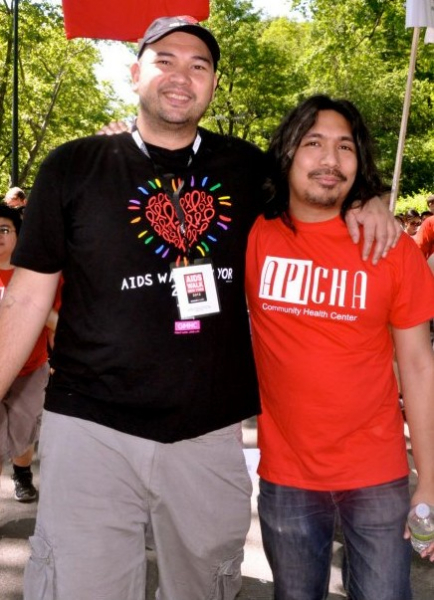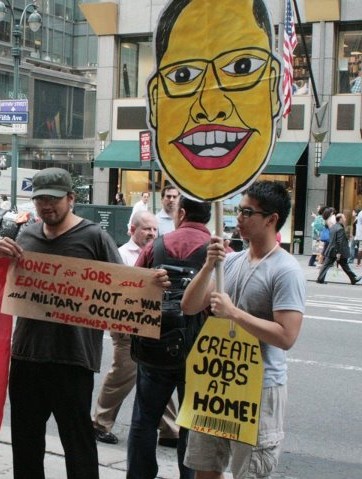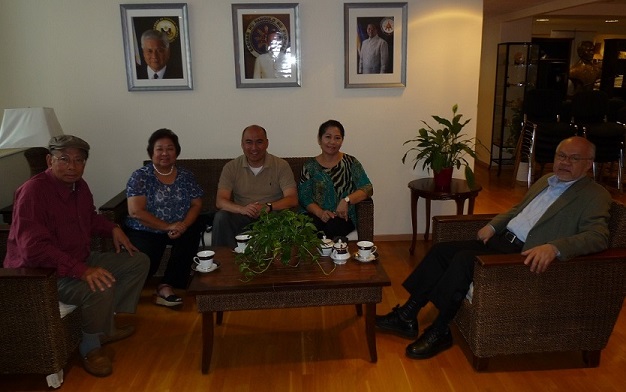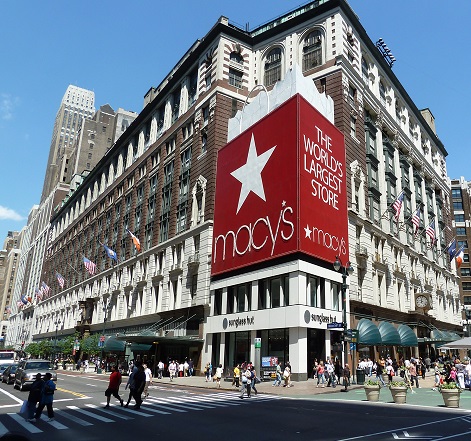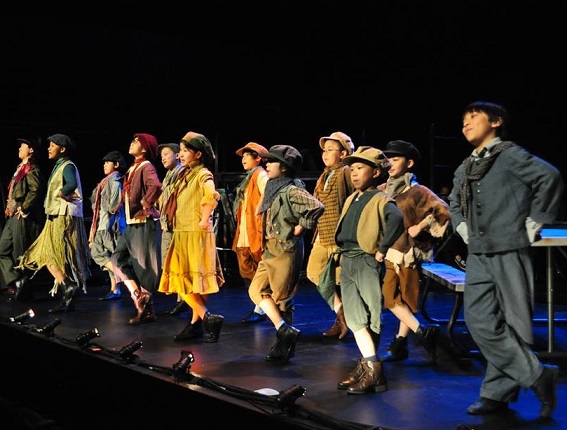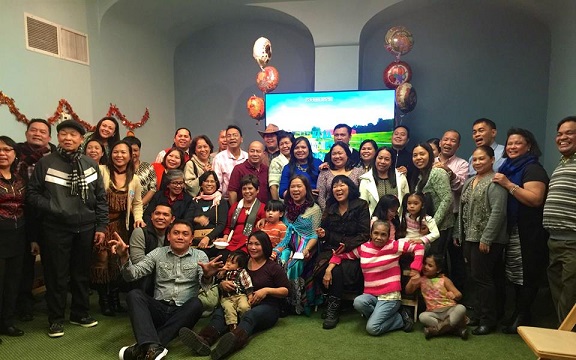How pop culture, social media played a role in Halalan 2016
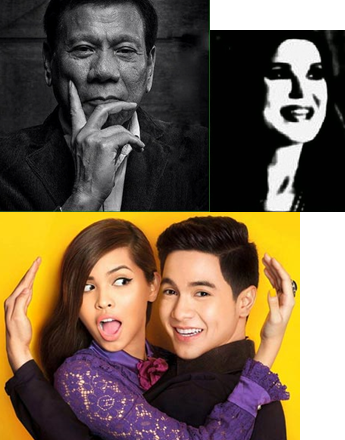
President-elect Rodrigo Duterte, actress Dovie Beams, and the AlDub love team: When pop culture and electoral politics intersect
When it comes to popular culture trends, the Philippines appears to be mimicking its former colonizer, the US, in some ways, and leading it in other ways, usually by resisting or overturning the trends the latter sets. The recently concluded presidential election provides fertile ground to study these older possibilities as well as a number of newer ones.
As most observers would have known by now, Rodrigo Duterte won the race by replicating Barack Obama’s folk appeal on social media, but also unnervingly appropriated Donald Trump’s exploitation of rage and discontent among the citizenry. Those old enough to remember could point to Ferdinand Marcos’s wily use of audiovisual media (with his wife Imelda as main accessory), reminiscent of John F. Kennedy’s feat in projecting a televised image of charm and intelligence. Marcos went further in taking the extra step of commissioning an increasingly fraudulent series of film hagiographies (the last one, Jerry Hopper’s “Maharlika,” was never released during his regime because it featured Dovie Beams, the mistress whose affair with Marcos ended in lurid scandal).
The connection between pop culture and electoral politics is more than incidental. For the past two years, Philippine cultural workers and commentators had been resorting to social media outlets in order to register their frustration with the negligence that President Benigno Simeon “PNoy” Aquino III had been devoting to their areas of concern. In a way PNoy was merely taking after his mother’s supercilious dismissal of culture (“not a priority” of her government, according to her spokesperson) – but without the crisis situation that had made Cory Aquino’s attitude more understandable, if not justifiable.
The turning point that consolidated netizens’ malcontent with Aquino’s high-handedness toward people’s preferences occurred in 2014, in his indefensible rejection of the cultural sector’s unanimous nomination of Nora Aunor as National Artist, with his representative advancing embarrassingly petulant reasons for his decision. In a matter of days, various “Nora Aunor for National Artist” group pages proliferated on Facebook – and a number of independent institutions, some of them government agencies, defiantly presented Aunor with life-achievement awards.
The subsequent “viral” pop-culture events, both of them in 2015, were not as overtly critical of the Aquino administration as the National Artist brouhaha, but they did indicate an increasing preference for intensive and enlightening exchanges, alongside the usual expressions of class hysteria and religious dogma. The noontime television phenomenon known as AlDub, a possibly inimitable postmodern improvisation of the budding romance between the fictional dubsmashing Girl Friday of Lola Inodora (a cross-dressed male actor) named Yaya Dub and real-life heartthrob Alden Richards, yielded its own unique coinage, ‘kalyenovela,’ and demonstrated for observers the importance of timing and the provision of entertainment, as well as the unpredictability of the public’s behavior.
The most recent major pop-culture sample in social media was the slow but relentless buildup toward blockbuster status of Jerrold Tarog’s historical epic, “Heneral Luna.” The exhortations among netizens to take the risk of watching a period film about a barely remembered hotheaded figure from the eve of the revolution against Spain seemed at first like a localized version of the call for help for the disaster victims of Typhoon Haiyan in 2013. Again, the pop-culture component provided unexpected appeal, since the movie yielded not just urgent political insights but also galloping (if generic) entertainment.
Hence the onset of the Philippine presidential campaign felt like all these events rolled into one, with elements of plot twists, outsize characters, fan-like devotion, and unpredictable-though-expected resolution suffusing the proceedings. The major takeaway was the contentious morality question of which candidate was the actual heroic figure (thereby rendering all the others villainous). When the dust had settled, for the presidential contest at least, the first point that everyone could agree on was remarkable: the candidate who had most successfully utilized social media won.
More intensive studies of the electoral exercise will have to be conducted, although at the moment, one can make certain provisional conclusions. The Duterte campaign team prepared a few years in advance on precisely the premise that social media would be crucial, probably taking a page or two from the Obama campaign (personal disclosure: I voted for neither Duterte nor the LP candidate, Mar Roxas). The timing they displayed was impeccable, with Duterte the last to emerge as candidate, thus tipping the hand of the ruling Liberal Party in implementing its series of demolition jobs against the other candidates.
When Duterte’s turn came, the candidate counter-intuitively led the charge against himself, admitting extrajudicial killings, dressing nonchalantly and cursing casually, supporting the Marcoses, disrespecting the Pope, Western ambassadors, and rape victims; the image generally contradicted his public-service record as humble and devoted mayor of the most successfully managed city in the country, and made the LP’s efforts against him seem like the hypocritical posturing of the privileged class – precisely the effect that the campaign team must have intended.
The deplorable result of the exchanges between Duterte followers and (primarily) LP supporters is that most netizens were drawn into taking positions for one or the other side and suffered the trauma of hate-based fundamentalist rhetoric; Facebook members announced May 10, the day after elections, as “friendship day,” although certain rifts would likely take longer than a day to heal.
To provide a contrast, the vice-presidential race, which was even more of a nail-biter in its head-to-head match between the LP candidate and Marcos’s son, was conducted with exemplary exchanges, even humor. When Marcos supporters claimed that the results demonstrated the occurrence of cheating, several genuine statisticians came forward and ran extensive tests with careful methodological explications from more complete datasets to prove that the allegations were unlikely to be true. As an amusing sidelight, other netizens engaged in a Twitter-generated slash fiction imagining queer encounters between the President-elect’s hunky surfer son, Baste, and Marcos’s slow-witted scion, Sandro, with the other candidates’ sons in supporting roles; by creatively deploying cues that designated who between the two was the actual object of desire, the authors subtly indicated their preference for Duterte and their (occasional) contempt for Marcos.
The primary issue in the next round of election campaigns would not be whether any candidate can ignore the function and importance of social media, but whether the hurtful, bruising level of personal attacks can be minimized, if not avoided. Perhaps the winning candidate might be the one who resists these unproductive tendencies? Again, close observation of future pop-culture phenomena might prove instructive.
Joel David is Professor for Cultural Studies at Inha University in Incheon, Korea, and was founding Director of the University of the Philippines Film Institute. His archival blog, Amauteurish! (at http://amauteurish.com) contains digital editions of his books and articles on Philippine cinema.

